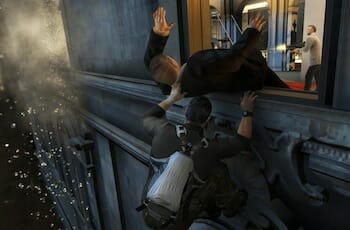Splinter Cell Conviction (Xbox 360)

Developer: Ubisoft Montreal
Publisher: Ubisoft
Platforms: Xbox 360, PC
Scattered reboot succeeds in spite of itself
There is an identity crisis at the heart of Tom Clancy’s Splinter Cell: Conviction that can best be addressed by answering the following question: Why is this game called “Conviction”? After all, the stealth-action adventure contains no references to our nation’s legal process—no judge, no jury, no court rulings. Perhaps the title is meant as an homage to protagonist Sam Fisher’s unwavering certainty?
The real answer, of course, is that Splinter Cell: Conviction was originally a radically different game than the one Ubisoft just released. Sam was to have been convicted of murder and on the run from the law, and the game would eschew its shadow-cloaked heritage in favor of an open-air sandbox approach akin to Ubisoft’s other stealth franchise Assassin’s Creed.
But after years of development snags, Ubisoft pulled the plug and ordered a complete design overhaul. Surprisingly soon afterward a much more conventional Conviction has made its way to store shelves, still in possession of its no longer relevant name.
For the most part, Conviction’s gameplay adheres to the familiar Splinter Cell formula. Most levels involve guiding Sam quietly through a series of dark, enclosed areas, carefully clearing each one of guards before moving on. The game’s pace, however, has been dialed up significantly. Sam is usually outnumbered, and players are forced to keep moving at all times to keep ahead of the smart, aggressive enemy AI. This is especially true on the highly recommended “realistic” difficulty level.
-

-

-

-

-

-

-

-

-

-

-

-

-

-

-

-

-

-

-

-

-

-

-

-

-

-

-

-

-

-

-

-

-

-

-

-

-

-

-

-








































